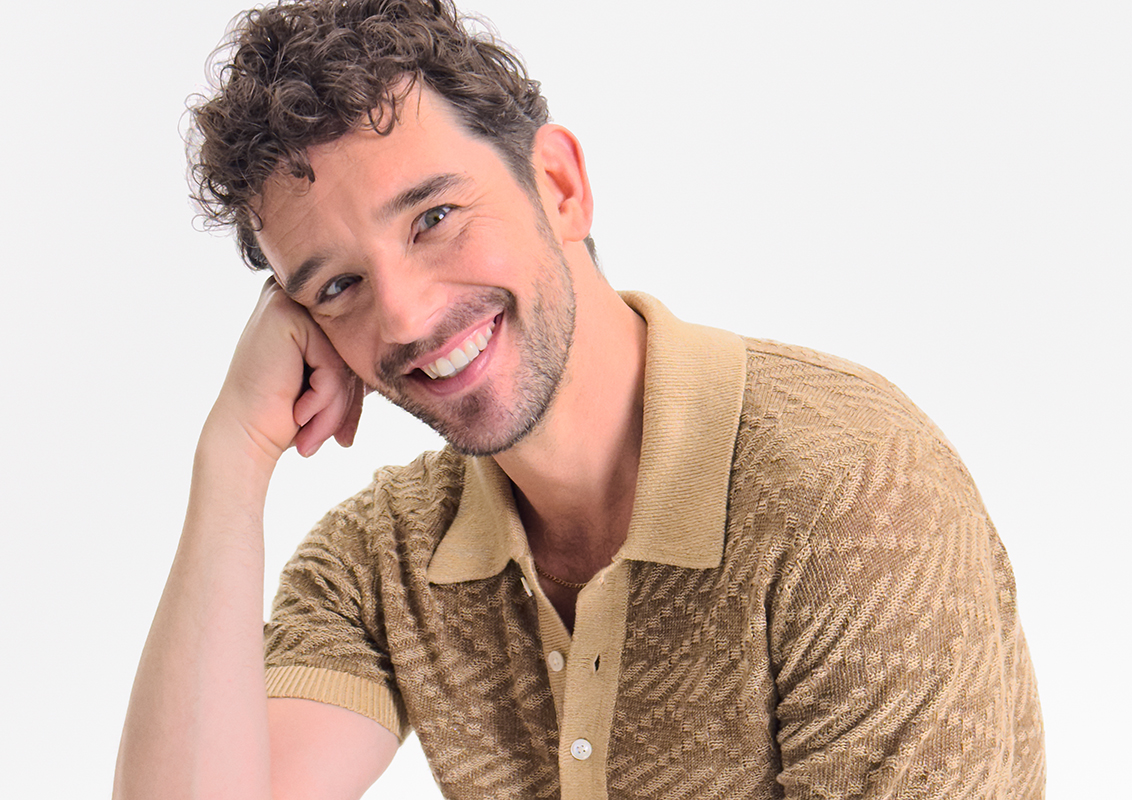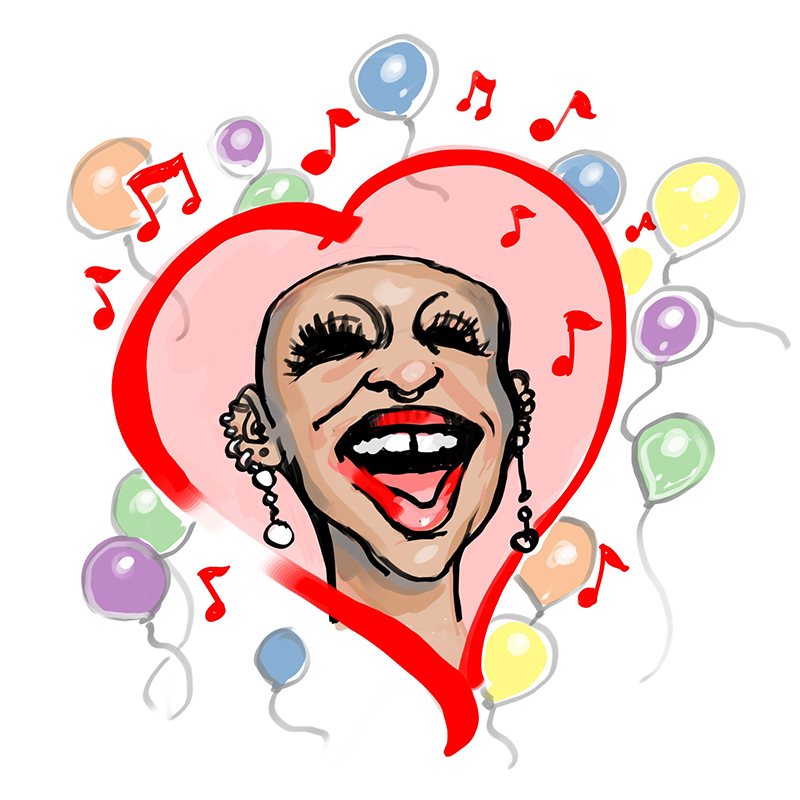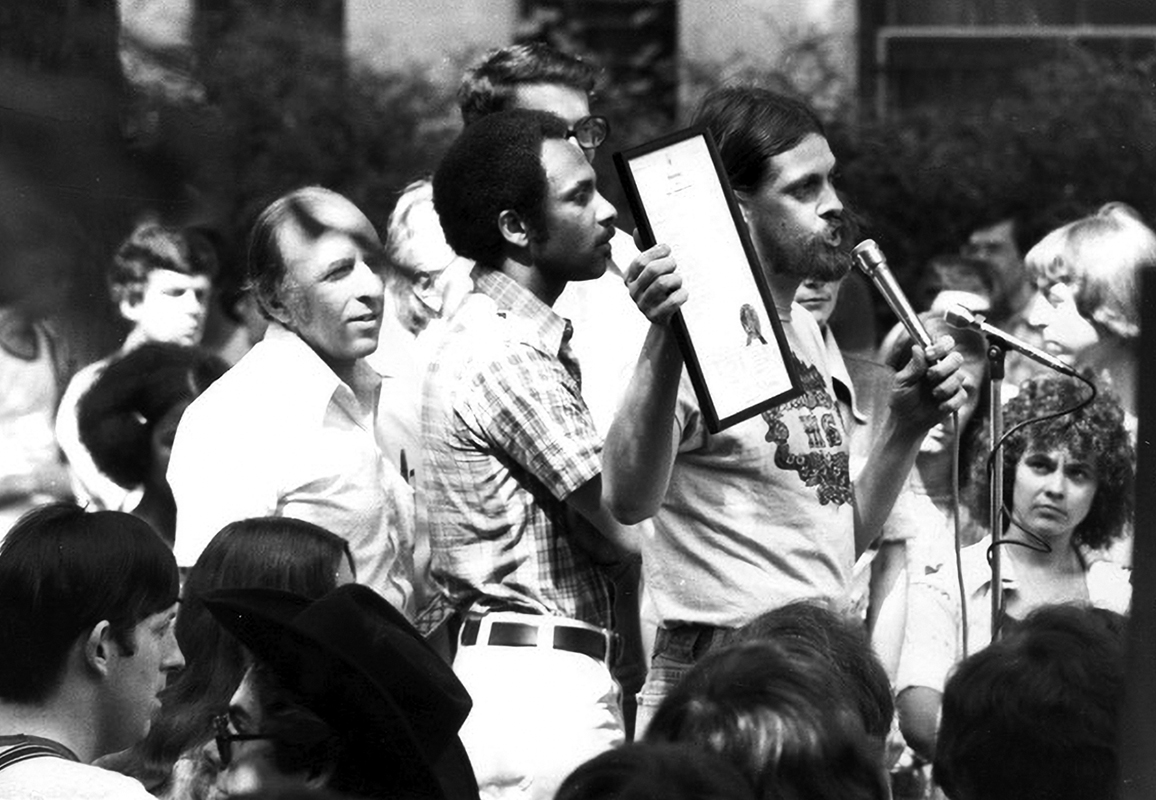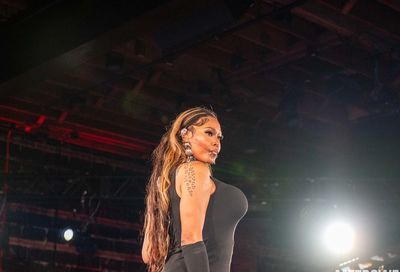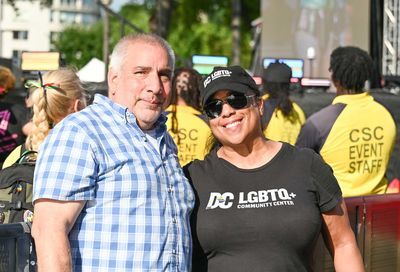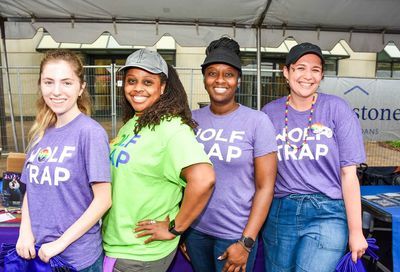Final Spin
As D.C. readies to choose a new mayor, where will gay and lesbian support go?
The election wheel turns once more, and D.C. finds itself in the midst of a tightly fought race for the mayor’s office. This being a Democratic town, the primary election is where much of the city’s political future is decided — even the beloved Carol Schwartz hasn’t been able to muster a strong Republican showing in the past.
So the race to succeed Anthony Williams will, in all likelihood, be decided next Tuesday, Sept. 12. Washington’s gay and lesbian community has been heavily courted by the candidates for mayor — and other candidates as well (see ”Racing for the Council”). And D.C. isn’t alone — Maryland is contesting a number of primaries on Tuesday as well (see page ”Maryland May Make History”). Virginia, which held its primaries earlier this summer, will decide the fate of its elected officials and a marriage amendment come November.
But to start off at the top of D.C.’s own political hill, here are the five major candidates Democrats will face in the booth come Tuesday.
Editor’s note: Ratings from the Gay & Lesbian Activists Alliance (GLAA) are provided as a guide, and not as an endorsement. Information on the GLAA ratings is available at www.glaa.org.
LINDA CROPP
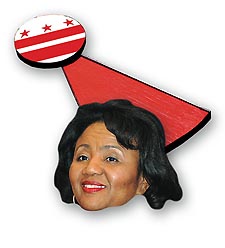
AS CHAIRMAN OF the D.C. City Council and possessor of a long political history in the district, it would be fair to say that Linda Cropp came into the mayoral race with her head above the crowd. The challengers from among her colleagues on the Council — part of a continually jockeying and fractious crowd, the management of which Cropp by nearly all accounts has handled ably — couldn’t match her name recognition within the GLBT or citywide communities.
That’s why a number of political observers have pegged the 2006 race as Linda Cropp’s to lose.
With her long history working with the GLBT community, Cropp outreached early and often to gay and lesbian leaders and decision-makers, garnering the support of prominent community members as well as such stalwart GLBT political organizations as the Gertrude Stein Democratic Club.
Born and raised in Philadelphia, Cropp arrived in D.C. as a student at Howard University. Her political career began in 1980, with a seat on the Board of Education, which she ran for at the urging of friends who were impressed with her work on education issues and local campaigns. Pursuing elected office wasn’t part of her original plan.
”I said I wasn’t interested in that, and they said, ‘You keep saying that things ought to change, so you ought to be a part of it,”’ says Cropp.
But with her path set by that first election, Cropp went on to gain an At-Large seat on the City Council, and in 1997 she became the first woman elected as the chair of the city legislative branch. That position makes use of what she identifies as her strongest political skill.
”My best skill is having a vision and being able to bring a diverse group of people together to make something happen,” she says. ”Certainly it’s been good for the Council, because now we’re recognized as a co-equal branch of government. For so long the Council oftentimes was a rubber stamp. But we aren’t. We’re a very active Council.”
Cropp points to her long record on HIV/AIDS, domestic partnership legislation and other GLBT issues as reason for the gay community to look to her as the city’s next mayor: ”Different people can say what they will do — and quite frankly, it’s much easier for them to say what they will do because I helped to lay the road so that it is easy for them to say it.”
On marriage equality, one of the central issues for the gay and lesbian community across the country, Cropp says that she supports civil unions as an equivalent institution, but she doesn’t believe it’s ”advantageous to provoke an argument from Congress, particularly this Congress” with an effort to push forward gay marriage.
But it wasn’t necessarily Cropp’s stand on particular issues that brought David Meadows to her campaign. Meadows, a former president of the Gertrude Stein Democratic Club, heard Cropp answering questions about the baseball stadium at a Christmas party last year. He was impressed at her inquisitiveness and willingness to listen.
”It showed me the clear difference, in my opinion,” he says. ”One person had a clear grasp on all the issues.”
Meadows joined the Cropp campaign early this year as Ward 6 coordinator and director of gay and lesbian outreach. He’s outspoken in advocating for Cropp’s long record on GLBT issues, going back to her days on the school board when supporting gay issues was more often a political liability.
”Even in her earliest elections she got a lot of heat, but she stood firm,” he says.
While Meadows acknowledges that gay and lesbian voters have choices in almost all the candidates, ”anyone who has been politically involved on the gay and lesbian scene here in D.C. within the last five years or longer, nine times out of 10, they’re with Linda Cropp.”
He points to her appearance at the Gertrude Stein forum earlier this year, when another candidate questioned her commitment to GLBT issues.
”She said, ‘Talk is cheap, but actions speak louder than words,”’ says Meadows. ”Then she reeled off list after list of things she has done to advance gay and lesbian rights,” from domestic partnership to HIV/AIDS to the repeal of the sodomy law to others.
”I liked that because it brought out a little bit of the diva in her — basically, she said that all of the other candidates combined could not match her record.”
While Cropp may have been considered the frontrunner at the start of the political season, that mantle has passed to Adrian Fenty, who has consistently led the field in many polls. And while Cropp has enjoyed strong support in the GLBT community, Fenty seems to have at least equaled it, if not surpassed it. In the last weeks of the campaign, Cropp has stepped up both her on-the-street campaigning as well as attacks on Fenty’s record. How much ground she can regain by Sept. 12 is one of the elections biggest wild cards.
GLAA rating: 9.5 (out of 10)
Web site: www.lindacroppformayor.com
ADRIAN FENTY
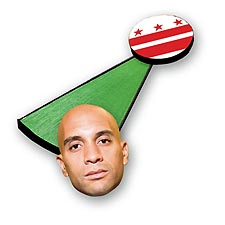
IF ANY CANDIDATE could be said to have hit the ground running for this year’s election, it would be Adrian Fenty, the candidate who started early and, as a result, may be finishing strong.
Having first made a citywide name for himself in 2004 by pulling off an upset in Ward 4, taking the long-occupied Council seat of Charlene Drew Jarvis, Fenty took a similar approach to his run for mayor: starting early, shaking every hand, knocking on every door, showing up for every event.
That effort has put him at the front of the race, according to many polls, a position that’s also made him a target for other candidates as Sept. 12 presses closer.
At 34, Fenty is a D.C. native, raised in Mount Pleasant, who became familiar with the city’s gay and lesbian community at an early age. Working in his family’s business — his parents own Fleet Feet, an athletic shoe store in Adams Morgan — he got to run with the D.C. Frontrunners, the city’s gay and lesbian running group. Between that and having a lesbian cousin, he ”never” had any issues being comfortable with gay and lesbian people.
That comfort level comes through in the sheer number of GLBT events Fenty has attended in the course of the past year. Both his face and his large green campaign stickers have been nearly ubiquitous from fundraisers to awards ceremonies to community gatherings.
”No question about it, we think that a mayor who connects with the GLBT community is a huge priority and it has to be on our agenda on a daily basis,” says Fenty. ”I’ve tried to keep that philosophy and approach since day one as an elected official — working with the community to make sure people feel welcome and that their views are being represented.”
While Fenty may have landed on much of the city’s radar with his victory in Ward 4, his ”passion for politics” started in high school. While his collegiate career was filled with internships and activities geared toward public policy, it was becoming a homeowner in Crestwood that refocused him on the local level.
”I love the city, I love politics, I love public service,” he says. ”I couldn’t imagine being an elected official anywhere else.”
Fenty has grabbed the attention of the GLBT community on a number of important issues, including his opposition to the baseball stadium that, now under construction, closed a number of long-standing, gay-oriented businesses. His enthusiastic support for banning smoking in D.C. businesses earned him broad support as well, although it earned him the ire of others who felt the ban encroached to heavily on the rights of business owners and smokers.
On gay marriage, Fenty has staked out an aggressive stance, arguing that gays and lesbians should have full marriage equality. In fact, his strong support for moving marriage as an issue has led some to criticize him for a willingness to provoke congressional action should marriage equality become a legislative reality in the district.
”Whatever the district decides, we should stand our ground,” he says. ”If Congress does do something, I think it would expose the national hypocrisy.”
He also notes that listening to the GLBT community itself on that point is important, as they’re the ones who have to live with the results. ”I understand that people do not want us to go far out on a limb, either, to prove a point or to be confrontational and then for it to upset their lives.”
One of Fenty’s earliest supporters and advisors from the GLBT community is Peter Rosenstein, who says he chose his candidate based on his belief that D.C. needs to bring ”new people, new ideas, into government.” He says Fenty is the person with the ”intellect and ability” to do that, and overcome the ”systemic problems” that keep D.C. from making that last leap to status as a ”world-class city.”
As a longtime political activist in D.C., Rosenstein has seen the influence the gay and lesbian community has in the political process. ”It’s very hard for anyone to be elected without the support of the gay community,” he says.
So Fenty’s comfort level with GLBT people was a clincher for him.
”[Fenty’s] part of a new generation we’ve been waiting for…who have absolutely no problem personally saying that the GLBT community should have every human and civil right that [they] have,” says Rosenstein. ”There’s no fear.”
Even with the formidable support lined up by the Cropp campaign — what Rosenstein terms ”the old-line gay community” — he believes Fenty will grab the large majority of gay votes in the city. He points to the cadre of ANC members, local GLBT business owners and prominent individuals who have thrown their support to Fenty because they ”see that as the future.”
The campaign for GLBT votes hasn’t been entirely without controversy: Fenty associate Sinclair Skinner was behind an anti-gentrification movement in the 14th and U neighborhood that attacked Ward 1 Councilmember Jim Graham as ”Grahamzilla” in a series of posters deemed by many to be both racist and homophobic. Rosenstein says he is satisfied with Fenty’s handling of the situation.
”I was 100 percent opposed to what Sinclair Skinner did,” he says. ”I have no question that Adrian is totally opposed to racism or homophobia of any kind.”
Rosenstein says Skinner is an example of someone the GLBT community needs to give a second chance, as Fenty has, even if his actions were ”outrageous” because, ”If we didn’t give [people who’ve expressed homophobic views] a second chance, there would be a lot of people we wouldn’t be talking to.”
Just one week out from the election, Fenty grabbed one the city’s largest election prizes in the endorsement of the Washington Post, as well as the Washington Examiner. Rosenstein says that the endorsement ”gives validation to what many people already assumed they were going to do in the polls.”
Fenty himself describes why he believes the GLBT community should cast their support for him.
”I think that people who are discriminated against want to have somebody in office who is going to fight for them, who’s going to stand up for what they believe and what the community believes in,” he says. ”I do believe that this city is a city of inclusiveness. I don’t think there’s any room in this city for us to go backwards by continuing to divide the city.”
GLAA Rating: 8.5
Web site: www.fenty06.com
MARIE JOHNS
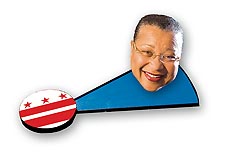
IF ANYONE COULD be crowned the queen of the candidate forums, it would be Marie Johns. From north and south to east and west, gay and lesbian to neighborhood associations, Johns has consistently turned in well-reviewed performances with her grasp of issues, willingness to listen, and readiness for change.
Unfortunately for her campaign, the polls say those performances haven’t been enough to get her out of single digits.
While it may be from a lack of money or name recognition, it hasn’t been for lack of trying. Late in the summer, Johns took to the streets with a billboard truck and her own personal soapbox, speaking to people on the street and taking whatever questions they posed about why she should be mayor. She managed to challenge frontrunner Adrian Fenty in a one-on-one debate in Southeast. She’s earned positive notices for her public speaking, her outsider background, her pledge to change the city for the better.
But.
That’s perhaps the word that best sums up the campaign of Johns, the former president of Verizon who scaled the corporate ranks from her early life growing up in the segregated world of Indianapolis. She inspires plenty of people to say, ”I’d like to vote for her, but I don’t think she can win.”
In many ways, Johns resembles the successful early 1990s mayoral campaign of Sharon Pratt Dixon (later Kelly), who followed up her experience as a Pepco executive to become the surprise winner after an underdog campaign and a timely endorsement from the Washington Post. But the comparison also reminds that Kelly lasted just one term, losing her re-election bid to the man she replaced, Marion Barry.
But — to use that conjunction more positively — Johns is in many ways a more energetic and energizing presence than Kelly ever was. And in her courting of the GLBT community, she’s found many who are receptive to her message. She’s a supporter of full civil marriage equality for gays and lesbians, although she also says that the situation with Congress warrants a careful approach.
”I don’t mean this as an empty gesture, but by the same token we have to understand the realities of being the last colony,” says Johns. ”We have to make sure that nothing is done that’s going to endanger the rights that we already have.”
Johns has also stressed the importance of helping GLBT youth. Everett Hamilton, an activist with D.C.’s African-American GLBT community and one of Johns’s early supporters, recalls watching his candidate meet with a group of GLBT youth at the Sexual Minority Youth Assistance League.
”She was very moved and affected by what they said,” says Hamilton. ”I could see that as a mother and a grandmother that she was visibly bothered and angry that nothing had been done about the housing issues…. She left with a great deal of commitment and respect.”
Hamilton says he was drawn to Johns as a candidate because she not only has ”tremendous skills” from her time managing a multi-billion dollar corporation, but because of her qualities as a leader.
”Leadership is not something you can be taught — it really is something that people are born with,” he says. ”It has been so easy for me in the course of over a year to follow her, not because she’s demanded or requested it, [but] because she’s set an example on the campaign trail.”
While four of the five major candidates in the mayor’s race have declared their support for GLBT issues — Vincent Orange’s comments on the ”morality” of gay marriage set him apart — Hamilton says the community should not ”sit back on our laurels.”
”We have to elect a leader who’s not only right on the issues, but who we’re convinced will stand up for us when the going gets tough.”
Hamilton also disagrees that the GBLT community has solidly lined up behind either Cropp or Fenty, pointing out that in their campaign swings through GLBT neighborhoods and businesses they’ve met plenty who are attracted to her message.
”There is not a person that I have met that does not think that Marie Johns is the greatest candidate since sliced bread, and then they say, ‘But I don’t think she can win,”’ he says. ”We just have to do the last little bit of work, [that] she will win when you vote for her.”
GLAA Rating: 6.5 (out of 10)
Web site: www.johnsformayor.com
MICHAEL BROWN
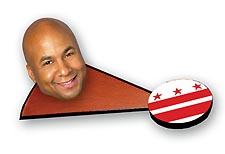
ALL POLITICS MAY be local, but all elections are about making it across the finish line. In the face of polls that place him in single digits behind frontrunners Cropp and Fenty, Michael Brown has brushed off suggestions that he end the campaign, focusing instead on crossing the finish line still running.
So Brown is spending the last days of the campaign on the streets, making his case face-to-face.
Over the course of his campaign, Brown has been just as energetic in pursuing the support of the GLBT community, staking out positions in support of marriage equality, taking on HIV/AIDS, and bringing a diverse city together. He’s been aggressive as well in delineating himself from his opponents, pointing to what he says is soft or inconsistent stands by the leading candidates on gay issues, including marriage. During the Gertrude Stein Democratic Club’s candidate forum, he took on the current councilmembers in the race, saying, ”Just because you’re in a leadership position doesn’t mean you know how to lead.”
Himself the product of a prominent local political family — his father, Ron Brown, was a civil rights activist, and served as Bill Clinton’s secretary of commerce until his death in a plane crash — Michael Brown has deep connections to the Democratic party, and he aspires to have his work on Capitol Hill as a lobbyist translate into a positive influence on that body if he becomes mayor.
While his main campaign themes have focused on the return to the old-style values the governed his youth in Shepard Park, he says acceptance of GLBT people is a part of that and discrimination has no place.
”The mayor of any city has the ability to set the tone, set the environment,” he says. ”Either you’re going to tolerate [discrimination] or you’re not, and I’m going to be a mayor that’s not going to tolerate it.”
He points to his own upbringing as the source of his outlook on the GLBT community and its role in the city’s life.
”I was raised that you treat everyone the same: You’re not above anyone else, you’re not beneath anyone else,” he says. ”It doesn’t matter what your orientation is, what the color of your skin is, how much money you make, or what part of the city you live in.”
Sterling Washington, a local activist who works with the D.C. Coalition and D.C. Black Pride, says he first heard Brown speak at a 2004 meeting of the Coalition. ”I was impressed with what he had to say, and his history with the community,” he says.
After seeing Brown, who is a former board member of the Whitman-Walker Clinic, at a number of other GLBT community events, and knowing of his ties to Democratic activism, Washington approached him and offered to join his campaign.
”I think it’s important to have that level of involvement in the community,” says Washington.
While Washington says he’s impressed with Brown’s range of understanding of GLBT issues, he’s concerned with a broad array of issues, ranging from GLBT affairs to housing to the environment. He also appreciates the inclusive approach he sees Brown taking in his campaign and policies.
”I think a lot of time in this election there’s been a tendency to create an us-versus-them situation,” says Washington, pointing to such recent issues as tussles between African-American churches and GLBT businesses. ”It’s not gay versus black, and it’s not either-or.”
Washington also says he thinks it’s time for change in D.C., and the way for that to happen is to vote for it.
”If they’re not happy with the city the way it is now, they shouldn’t vote for someone who was part of the problem,” he says. ”But most people I talk to aren’t really happy with the direction the city is going.”
As for the stories and polls that show him trailing, Brown has sounded positively optimistic in the weeks leading up to the election, an optimism Washington shares as Sept. 12 approaches.
Says Washington: ”I hope people don’t let the press decide the election for them.”
GLAA Rating: 7 (out of 10)
Web site: www.brownformayor.com
VINCENT ORANGE
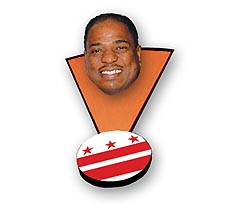
READING THE SUMMER/fall 2005 edition of The Orange Report, D.C. Councilmember Vincent Orange’s newsletter to his Ward 5 constituents, one would get an impression of Orange as fairly progressive when it comes to issues concerning the GLBT community. One story touts Orange’s efforts in helping to make the mayor’s Office of LGBT Affairs a permanent office. On the same page, another story outlines Orange’s desire to clarify the D.C. Human Rights Act by adding ”gender identity and expression” for added protection of the transgender community. As the race for D.C. mayor got underway, Orange joined the other four major candidates at a May forum for the gay community. Again, he offered his support of the office and clarification of the Human Rights Act as evidence of his support of the community.
Though conventional wisdom never pointed to Orange as a favorite among gay D.C. voters in this mayoral race, his support for GLBT-friendly legislation paired with his reasonable courtship of the gay vote made his Aug. 12 comments to WTTG Fox 5 News all the more controversial: ”I am the only one [of the mayoral candidates] that is opposed to same-sex marriage. The other four, they say they believe in God, they go to church, but they’re also for same-sex marriage…. I don’t think they’re morally fit to run this city.”
The indication is that Orange is trying to differentiate himself from the field of candidates at this point, with hopes of shoring up his support among socially conservative district voters. If the GLAA ratings are any indication, that strategy is likely Orange’s only hope for becoming mayor. The political group gave Orange a -2.5 score out of a possible +/-10, making him the only mayoral candidate with a negative rating. GLAA cited both Orange’s Aug. 12 statement, as well as his opposition to allowing adult-oriented gay businesses displaced by the proposed baseball stadium to relocate in his ward.
Further, when given an opportunity to clarify his Aug. 12 comments for Metro Weekly readership, the Orange for Mayor campaign declined to respond.
GLAA Rating: -2.5
Web site: www.orangeformayor.com
Unless otherwise noted, comments by the candidates were taken from interviews previously conducted by Metro Weekly. View each of these interviews from the links below.
|
Support Metro Weekly’s Journalism
These are challenging times for news organizations. And yet it’s crucial we stay active and provide vital resources and information to both our local readers and the world. So won’t you please take a moment and consider supporting Metro Weekly with a membership? For as little as $5 a month, you can help ensure Metro Weekly magazine and MetroWeekly.com remain free, viable resources as we provide the best, most diverse, culturally-resonant LGBTQ coverage in both the D.C. region and around the world. Memberships come with exclusive perks and discounts, your own personal digital delivery of each week’s magazine (and an archive), access to our Member's Lounge when it launches this fall, and exclusive members-only items like Metro Weekly Membership Mugs and Tote Bags! Check out all our membership levels here and please join us today!








